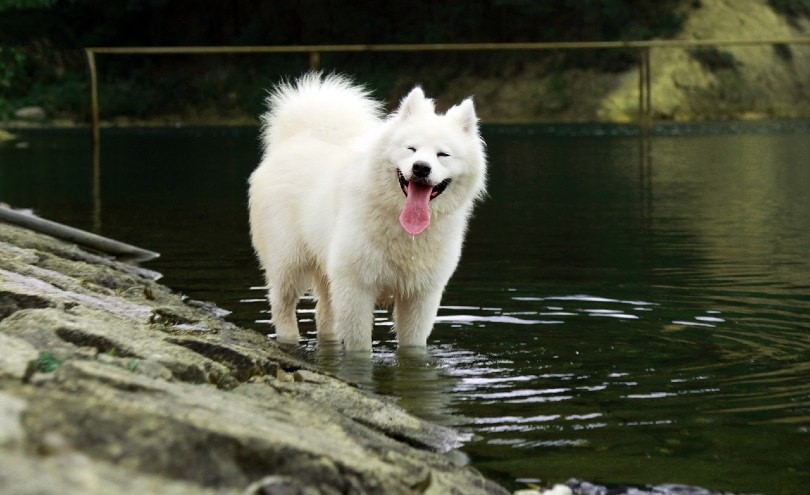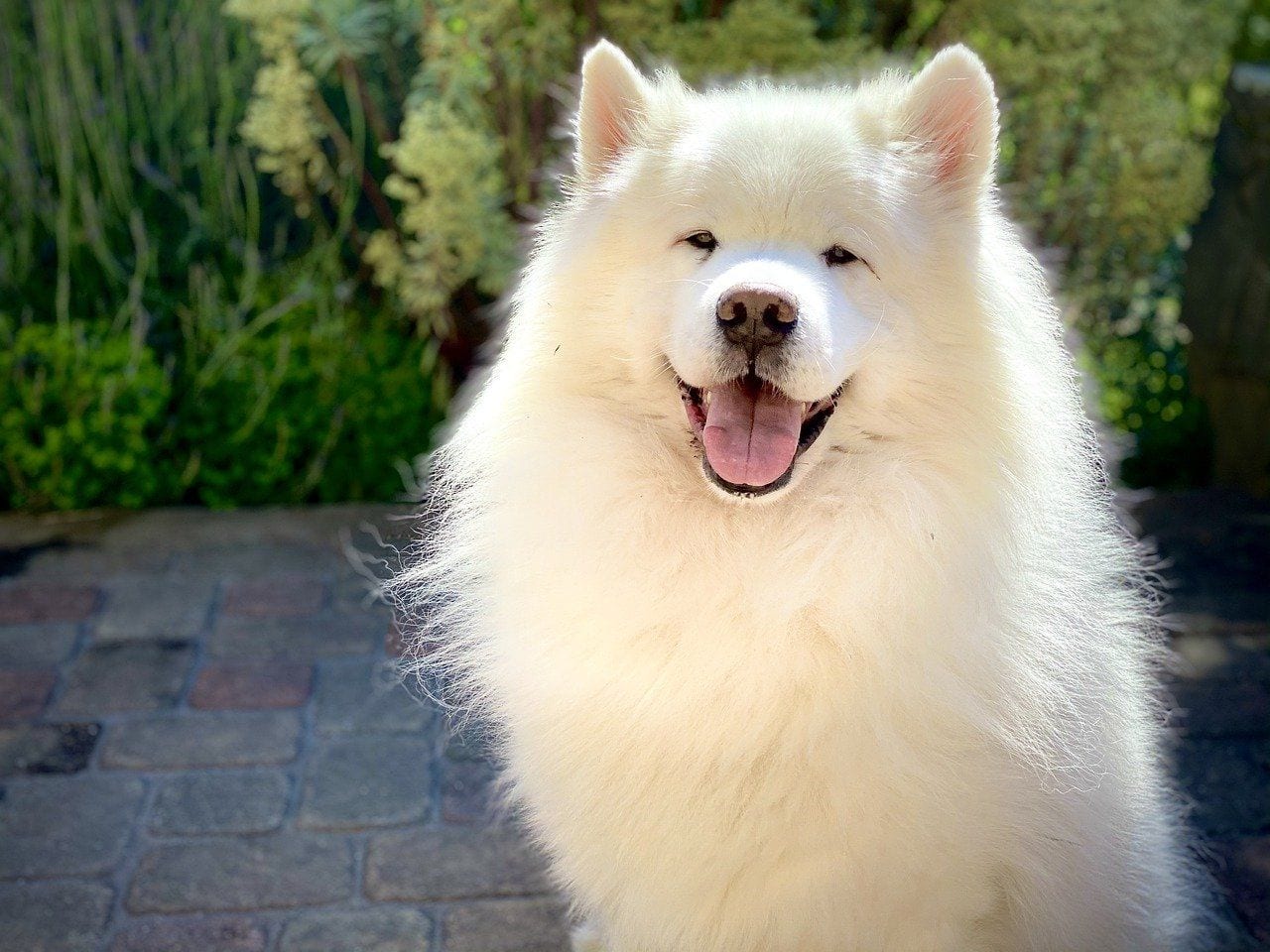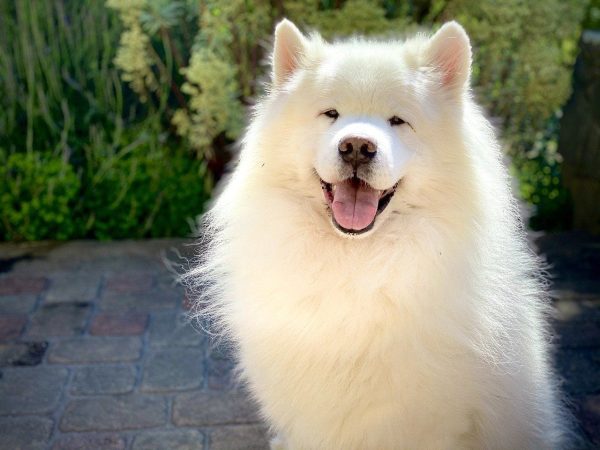Samoyeds have earned the nickname, “the smiling sled dog.” These friendly pups are medium-sized dogs with a herding instinct. They have a history of breeding in some of the coldest and roughest regions of the world. The Samoyed gets their name from the Samoyedic people in Siberia. They bred the fluffy white dogs to act as reindeer herders and pull their sleds.
Samoyeds have thick double-layer coats full of fluffy white fur. They are friendly, alert, playful, and sociable, but are they hypoallergenic? Although no dog is truly hypoallergenic, Samoyeds are considered to be one of the better breeds for people with allergies.
In this article, we discuss what being “hypoallergenic” really means, what causes dog allergies in humans, and if Samoyed dogs are actually hypoallergenic.

What Does Hypoallergenic Mean?
The term hypoallergenic has only recently been associated with dogs. The word was initially developed as a descriptor for the textile and cosmetic industry. They used it to describe products that were not likely to bring on an allergic reaction. These products typically had fewer ingredients and were smoother on sensitive skin.
People can be allergic to almost anything, and there are also varying levels of allergies. Some people who are allergic to peanuts might only get itchy if they eat it. For others, it means going into anaphylactic shock and getting rushed to the emergency room.
The term “hypoallergenic” means that you are unlikely to have an allergic reaction, not that you are guaranteed total safety. That means any dog considered to be hypoallergenic could still trigger an allergic reaction in people with strong allergies to them. An allergic reaction is less likely to happen, but it still could.
All of this is valuable to keep in mind because those with allergies to dogs might not be able to own a hypoallergenic dog either. Before adopting, you should be around them, pet them, and be close to them for a while before adopting them and taking them into your house. It will end up causing you less hassle and allergies and causing the dog less confusion by getting adopted and then being rehomed again.

Dog Allergy Causes
Many people believe that dog hair acts as an allergy trigger when it is shed around the home. However, that is not often the case, although it can be related.
The typical trigger for a dog allergy is actually dander or flakes of dead skin.
The confusion is because dog hair usually acts as a carrier for dander. The more that a dog sheds, the more dander they spread around the home. The tiny pieces of dead skin attached to the hair float onto furniture, carpet, clothes, and corners when the old hair falls out.
Interestingly, the two aren’t always tied together. Typically, dogs that shed less are more hypoallergenic, but in the Samoyeds, this is not true.
Are Samoyeds Hypoallergenic?
Samoyeds are currently considered to be hypoallergenic dogs. However, on a theoretical scale of more and less hypoallergenic, these dogs are less than other breeds that fall into this category.
Most people with dog allergies may still feel bothered if they are around a Samoyed pup for too long. But for some people with allergies, they won’t feel a thing. For this reason and for Samoyeds in particular, you should spend time around them before adopting one because the chances of an allergic reaction are still high.

Do Samoyeds Shed a Lot?
Samoyeds do shed frequently. That is part of the reason that experts heavily debate their classification as a hypoallergenic breed. They require more maintenance than most hypoallergenic dogs to trigger less of a reaction.
The other problem is that Samoyeds have double coats. Twice a year, they “blow” these coats, meaning they lose almost all of their underlayer at once, causing mounds of dog fur to come out of them in large chunks. These two seasons, usually spring and autumn, can be an especially trying time for dog owners with sensitivities.

Extra Precautions You Can Take
There are ways you can take precautions to mitigate the allergies and reactions that you might get as the owner of a Samoyed pup. Brushing them every day is one of the best ways to do so. It is even better if someone else in your household who doesn’t have allergies brushes them.
Beyond brushing them each day, you should groom and bathe them regularly. The cleaner your Samoyed is, the less likely they are to continuously shed dander and dust from their coats throughout your home.
Grooming and bathing them are particularly essential during those two times each year that they blow their coat. Take them to a groomer to get them “blown out.” This special grooming treatment effectively rids them of a vast majority of their shedding undercoat all at one time, limiting the amount that they shed around the house.
Other than keeping your Samoyed clean, try to persist in keeping your clothes and furniture free of their white fur. Use a pet roller to get as much of it off the couches and chairs as possible, so when you sit down, you don’t unwittingly send dander flying into the air around you.
Another good idea is to keep them out of your bedroom, especially off your bed. If you find that you still have problems breathing at night or perhaps your eyes and nose water more, get a HEPA air filter to clean the air that you breathe all night long and keep you feeling healthier each morning.
Final Thoughts
Although Samoyeds are not usually the best breed for allergy sufferers, they are still classed as hypoallergenic dogs. If owning one of these smiley characters has been your dream, acquaint yourself with them first before attempting ownership. Expect to put in plenty of work, and your allergies and your Samoyed will hopefully get along just fine.
Related Reads:
Featured Image Credit: DantasticImages, Pixabay








